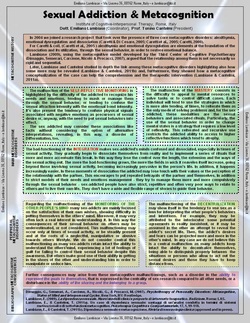
Lambiase, E. & Cantelmi, T. (2011), Sexual addiction & metacognition.
Poster presentato al “2011 SASH National Conference” dal titolo “Creating a Culture of Healty Sexuality: Sexual Addiction, Treatment and Trauma”, San Diego, CA, 21/9/2011.
METACOGNITIVE HISTORY
In 2004 we joined a research project that took over the presence of three core metacognitive disorders: alexithymia, emotional dysregulation and dissociation (Caretti & Di Cesare, 2005; Caretti et al., 2005; Caretti, 2008).
For Caretti & coll. (Caretti et al., 2005 ) alexithymia and emotional dysregulation are elements at the foundation of the dissociation and its utilization, through the sexual behavior, in order to restore emotional balance.
Lambiase (2009), using the metacognitive model developed by the Third Center of Cognitive Psychotherapy (Dimaggio, Semerari, Carcione, Nicolò & Procacci, 2007), argued that the relationship among them is not necessarily so rigid and sequential.
Later, Lambiase and Cantelmi studied in depth the link among these metacognitive disorders highlighting also how some more may be revealed (Lambiase & Cantelmi, 2011b) and, furthermore, they showed how a metacognitive conceptualization of the case can help the comprehension and the therapeutic intervention (Lambiase & Cantelmi, 2011a).
MAIN METACOGNITIVE DISORDERS
The malfunction of the SELF-REFLECTIVE MONITORING is highlighted by the difficulty of the addicted to recognize his needs and emotions, tending to mask or manage them through the sexual behavior; or tending to confuse the sexual attraction intensity with the emotional bond intensity. It’s also present the tendency to confuse physical signals associated with negative emotions as precursors of sexual desire or, anyway, with the need to put sexual behaviors into effect.
The sex addicted may consider these associations like facts without considering the option of alternative interpretations, revealing, in this way, a disorder of Differentiation, too.
The malfunction of the MASTERY consists in the difficulty to appeal to mental resources to solve tasks or to control difficult cases. Each individual will tend to use the strategies in which is more able tending, at times, to reiterate them as the only mode of solving problems and, for the sex addicted, these modalities are the sexual behaviors and associated rituals. Particularly, the use of the sexual behavior in order to change mental states is a strategy that requires a low level of reflexivity. This reiterated and recursive use restricts the addicted ability to access to higher reflective functions which tend to atrophy.
The bad-functioning of the INTEGRATION makes sex-addicted’s minds confused and dissociated, especially in times of sexual activity. They gradually begin to dissociate themselves from reality and to implement a series of rituals that more and more accentuate this break. In this way they lose the control over the length, the extension and the ways of the sexual acting-out. The more the bad-functioning grows, the more the fields in wich it reaveles itself increase, going beyond those involving sexual activity, becoming increasingly pervasive in the person’s life. In addition, it happens increasingly easier. In these moments of dissociation the addicted may lose touch with their values or the perception of the relationship with the partner. This encourages to put repeated betrayals of the partner and themselves. In addition to strict models of their needs and emotions management – they try to manage them more and more compulsively through the sexual behavior – sex-addicted people have also strict, repetitive and often very poor ways to relate to others and to live their own life. They don’t have a wide and flexible range of stories to guide their behavior.
PERIPHERAL METACOGNITIVE DISORDERS
Regarding the malfunctioning of the MONITORING OF THE OTHER PEOPLE’S MIND many sex-addicts are mainly focused on the satisfaction of their own wishes, showing difficulty in putting themselves in the others’ mind. Moreover, it may very often lack a real interest in understanding it. In this way the consequences of their sexual behavior on others may be underestimated, or not considered. This malfunctioning may occur only at times of sexual activity, or be steadily present and at the roots of a neglectful, manipulative or abusive towards others lifestyle. We do not consider central this malfunctioning as many sex-addicts retain intact the ability to understand the others’mind, experiencing a lot of feelings of guilt for failing to control their sexual behavior despite this awareness. But others make good use of their ability in getting in the shoes of the other and understanding him in order to manipulate or seduce him.
The malfunctioning of the DECENTRALIZATION may show itself in the tendency to use sex as a lens for interpreting the other people’s behaviors and intentions. For example, they may be attributed to the interlocutor some potential agreements in reality inexistent, or it may be assumed in the other an attempt to reveal the addict’s secret life. Then, the addict’s desires and fears can be projected more and more in the other’s mind. In any case we do not believe this is a central malfunction as many addicts keep intact the ability to decentralize themselves, being able to distinguish properly between the situations or persons who allow to act out the sexual desires and those they have to keep distance from.
METACOGNITIVE CONSEQUENCES
Further consequences may arise from these metacognitive malfunctionings, such as a disorder in the ability to represent the goals to themselves, that is expressed in the centrality of sex research compared to all other needs, or a disturbance in the ability of the sharing and the belonging to a group.
BIBLIOGRAPHY
Dimaggio, G., Semerari, A., Carcione, A., Nicolò, G., & Procacci, M. (2007). Psychotherapy of Personality Disorders: Metacognition, States of Mind and Interpersonal Cycles. New York, NY: Routledge.
Lambiase, E. (2009). La dipendenza sessuale. Nuovi modelli clinici e proposte di intervento terapeutico. II edizione. Roma: LAS.
Lambiase, E., & Cantelmi, T. (2011a). Un caso di dipendenza sessuale: vantaggi di un’analisi condotta in termini di sistemi motivazionali e di sottofunzioni metacognitive. Psicoterapia Cognitiva e Comportamentale, 17, 1, 99-118.
Lambiase, E., & Cantelmi, T. (2011b). Dipendenza sessuale e metacognizione. Rivista di sessuologia clinica (approved and in press).